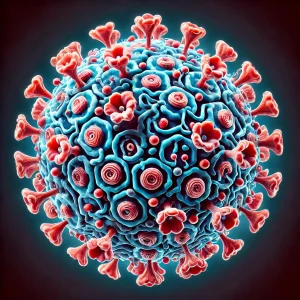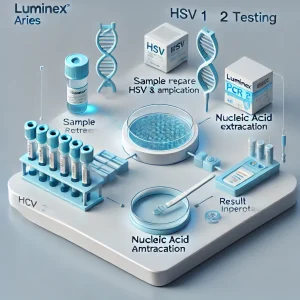Introduction
The Luminex® Aries® HSV 1 & 2 PCR Panel is a rapid molecular diagnostic tool designed for the detection of Herpes Simplex Virus (HSV) types 1 and 2. This assay provides accurate, timely results, aiding in the diagnosis and management of HSV infections. Quality control (QC) is critical to ensuring test reliability, clinical accuracy, and regulatory compliance. Various governmental and educational institutions, including the Centers for Disease Control and Prevention (CDC), U.S. Food and Drug Administration (FDA), and Clinical Laboratory Improvement Amendments (CLIA), provide guidelines for maintaining high-quality molecular diagnostics.
Importance of Quality Control in HSV 1 & 2 PCR Testing
Quality control ensures consistency, accuracy, and reproducibility in molecular testing. Proper QC measures help detect potential false positives, false negatives, and assay failures, ensuring patient safety and optimal clinical outcomes. Organizations like the CDC offer best practices for laboratory diagnostics (CDC Laboratory Standards), while the FDA regulates in vitro diagnostic testing to maintain quality (FDA IVD Regulations).
Steps in HSV 1 & 2 PCR Testing and QC Measures
The Aries HSV 1 & 2 PCR Panel involves multiple steps, each requiring strict quality control to ensure test reliability.
1. Sample Collection & Handling
- Proper specimen collection is essential to avoid contamination and degradation (CDC Specimen Guidelines).
- Sterile techniques and validated transport media are required for optimal sample preservation (NIH Sample Handling).
- Storage conditions should adhere to WHO guidelines to maintain RNA/DNA integrity (WHO Laboratory Standards).
2. Nucleic Acid Extraction and PCR Amplification
- RNA/DNA extraction quality affects downstream PCR results. The NIH provides best practices for nucleic acid stability (NIH Nucleic Acid Guidelines).
- Dedicated workspaces for pre- and post-PCR steps help prevent cross-contamination (FDA PCR Contamination Guidelines).
- Internal controls must be included to verify RNA/DNA integrity and eliminate inhibition risks (CLIA Quality Control).
3. Aries HSV PCR Panel Processing
- The Aries PCR system automates molecular testing, requiring periodic calibration and maintenance (FDA System Calibration).
- Proficiency testing ensures inter-laboratory result accuracy (CAP Proficiency Testing).
- Both positive and negative controls should be used to validate test performance (CDC PCR Quality Assurance).
4. Result Interpretation and Reporting
- Clinical interpretation of HSV PCR results must align with established validation criteria (NIH Clinical Microbiology Standards).
- Laboratories should monitor cross-reactivity issues and potential false positives (CDC Cross-Reactivity Studies).
- Compliance with CLIA and FDA guidelines is mandatory for proper result reporting (CMS Laboratory Regulations).
Challenges in HSV 1 & 2 PCR Panel Testing
Despite the reliability of the Aries HSV PCR Panel, several challenges impact test performance:
- Potential sample contamination: Strict contamination control measures are necessary (FDA Contamination Prevention).
- Genetic variations in HSV strains: Continuous monitoring of mutations ensures primer efficiency (CDC Pathogen Genomic Surveillance).
- Variability between laboratories: Standardized protocols reduce inconsistencies (WHO Laboratory Protocols).
Regulatory Compliance and Accreditation
Adhering to national and international regulations ensures test accuracy and laboratory accreditation.
- Clinical Laboratory Improvement Amendments (CLIA) sets laboratory testing standards (CMS CLIA Overview).
- FDA oversees in vitro diagnostic tests (FDA IVD Oversight).
- World Health Organization (WHO) provides global molecular diagnostic guidelines (WHO Laboratory Testing Standards).
- College of American Pathologists (CAP) supports laboratory accreditation (CAP Accreditation).
Future Advancements in HSV PCR Testing
Technological innovations aim to enhance sensitivity, accuracy, and automation in HSV molecular diagnostics.
- Next-generation sequencing (NGS) to improve pathogen detection (NIH NGS Research).
- Artificial Intelligence (AI) for PCR result analysis (FDA AI in Diagnostics).
- Automated molecular workflows to minimize human error (CDC Automated Testing).
- Multiplex PCR innovations to detect multiple infections simultaneously (NIH Multiplex Testing).
Conclusion
Quality control in Luminex® Aries® HSV 1 & 2 PCR Panel testing is essential to maintain diagnostic accuracy, patient safety, and compliance. Following CDC, FDA, CLIA, WHO, and CAP guidelines ensures the highest molecular testing standards. Ongoing advancements in automation, AI, and next-generation sequencing will further optimize HSV diagnostics, contributing to better infection surveillance, clinical management, and patient care worldwide.


